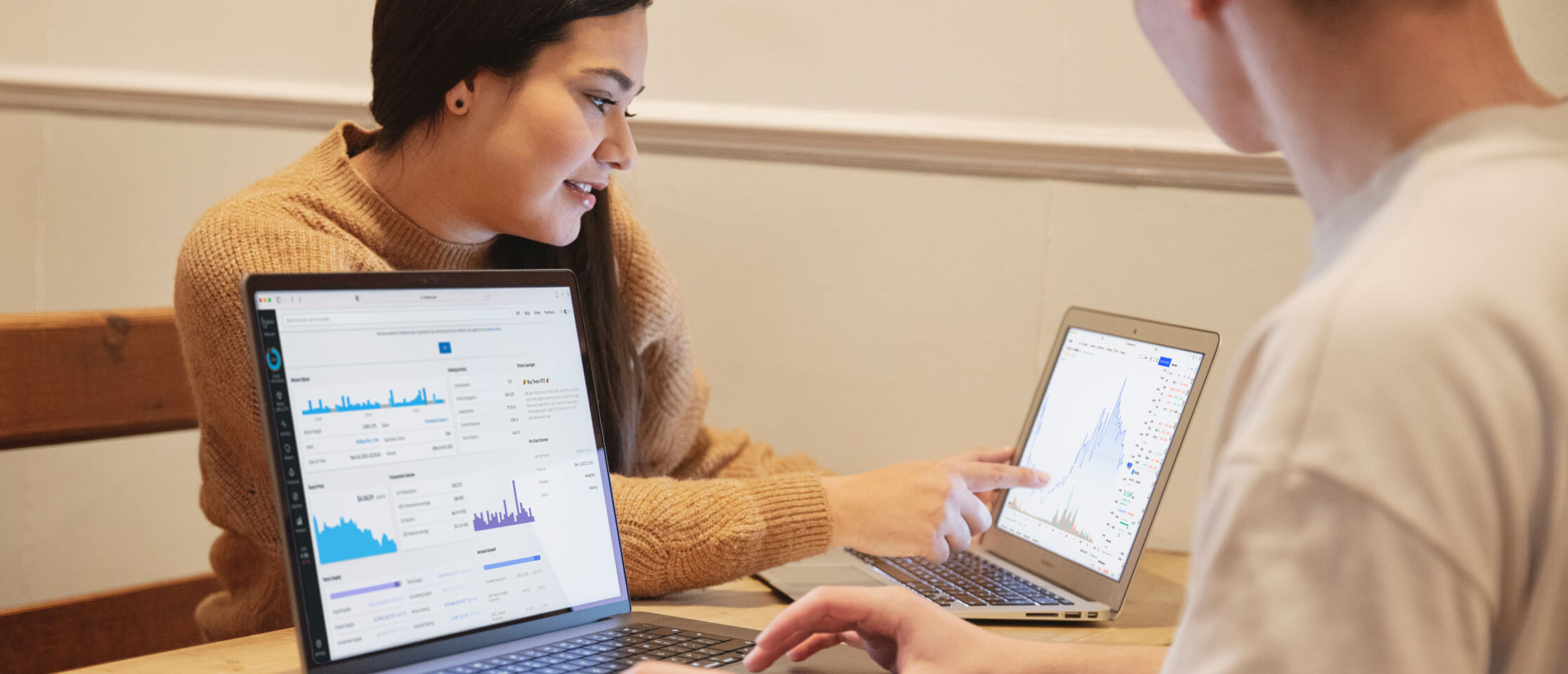How to Store Your Crypto Assets: Different Types of Wallets
It becomes much easier to acquire some amount of crypto assets these days. First of all, in order to send or receive cryptocurrencies, such as Bitcoin or Ethereum, you need to open an appropriate wallet to store your assets. And this is where many users are confused by the variety of crypto storage options. Today Finscanner will give you a hand with storing your crypto by reviewing several types of wallets, with a prime focus on reliability and security.
What is a cryptocurrency wallet?
First of all, a cryptocurrency wallet is not a physical wallet and represents a tool to store your public and private keys. Both are used to send and receive cryptocurrency using transactions. A public key represents your login with a set of letters and numbers. It means that a user can share his public key (address) with another user to receive funds. Meanwhile, a private key should never be shared with anyone. It provides access to your crypto funds taken as a password. Any person who has your private key can access the funds in your wallet. Most importantly, if you lose your private key, you will lose access to your funds.
The functionality of crypto wallets completely differs from financial companies serving accounts with centralized digital assets. If the latter independently keep records of transactions, then wallets only provide an interface for conveniently making transfers, conversions, and other operations. If you lose your crypto wallet, you can either open a new one or restore it, as long as you have the seed phrase or private key safely backed up.
Types of crypto wallets
Now that you know some background information about the crypto wallet in general, let’s talk about the different types of wallets. There are at least 5 types of wallets: online, mobile, desktop, hardware, and paper. Each one has different security considerations. All these types are divided into two overarching categories: hot and cold wallets.
Cold wallets are offline wallets (not accessible via the internet) that are considered the most secure way to store your crypto. Here your keys are stored on a medium or device offline, making them resistant to hacking attempts. If your computer gets compromised through a virus or a hacker, your crypto is still safe, since hackers would need physical access to your wallet. A cold wallet works best in case you are willing to hold crypto long-term. These include: hardware wallets and paper wallets.
Hot wallets are online wallets (accessible via the internet) that are considered to be more convenient since you can easily access and trade with them, making them optimal for traders and frequent users. The downside is they are connected to the internet 24/7, therefore more vulnerable to hackers and not as secure as cold wallets. As a practical matter, users try not to leave large amounts of their funds in a hot wallet. These include: browser wallets, crypto exchange wallets, desktop, and mobile wallets.
Types of hot wallets
Browser wallets. A good internet connection and an updated browser version are enough to launch this type of wallet. All the functionality for conducting transactions is available directly on the wallet’s website — quite convenient, but extremely unsafe. The private key and personal data of users can be stored both on the user’s device and on the company’s servers. In the second case, before choosing a wallet, you need to evaluate security measures, work experience, and feedback about its developer, because the safety of your funds will be directly at stake.
Crypto exchange wallets. Most crypto exchanges have their own built-in wallet for working with the platform’s cryptocurrencies, such as Bitcoin. This type of wallet is suitable for those who plan to trade their crypto or conduct transactions frequently. However, it should be borne in mind that such wallets are custodians, they store private keys and technically have access to all users’ coins.
Desktop and mobile wallets. Desktop and mobile wallets are downloaded and installed on your personal computer or mobile device using the operating system of your choice. Both desktop and mobile wallets provide a high level of security; however, they cannot protect you from security breaches, hacks, and viruses, so you should do your best to avoid malware and viruses.
Types of cold wallets
Hardware wallets. This type of wallet is generally viewed as the most secure storage option, isolating private keys from the internet by keeping them offline in a USB-connected device and giving holders full control of their crypto. A hardware wallet must be received directly from a manufacturer to provide the highest security.
Paper wallets. It is the most simple type of cold storage as public and private keys are handwritten or printed on a piece of paper. When printed, they often include QR codes that can be scanned to execute transactions. The public and private keys are created online or offline, using a paper wallet generator on a website or by downloading software.
Pros and cons

Open your crypto wallet with the Finscanner marketplace
Here are some of the crypto wallets available on the Finscanner marketplace:
Spectrocoin (mobile) — an all-in-one solution for Bitcoin. Services offered include a wide range of Bitcoin solutions, from exchanges to Bitcoin e-wallets. SpectroCoin builds its business policy on Bitcoin’s philosophy of making financing quicker, frictionless, and flexible. Our service provides a solution for each client’s needs instead of asking them to adapt to us. That includes every aspect of service, starting from the number of payout methods to the range of support languages available.
Coinspaid (desktop & mobile) — provides cryptocurrency payment services and personal wallets. We enable customers to operate worldwide, decrease costs and reach new markets whilst using our reliable cryptocurrency processing services and the wallet app. CoinsPaid operates under Dream Finance OU, registered and licensed in Estonia. Dream Finance OU has two brands: CoinsPaid — a personal wallet focusing on B2C clients, and CryptoProcessing.com — a crypto processing service for B2B customers.
Exodus (desktop & mobile) — a multi-cryptocurrency wallet that boasts an easy-to-use UI. You can keep your 0x, Aragon, Augur, Basic Attention Token (BAT), Bancor, Civic, District0x, EOS, Edgeless, FirstBlood, FunFair, Gnosis, Golem, iExec RLC, Matchpool, Metal, Numeraire, OmiseGo, SALT, SingularDTV, Storj, Status, WeTrust and Wings all in one place and easily calculate and organize your savings with their pie chart portfolio. Exodus has a built-in exchange that allows you to instantly trade the supported coin between themselves. The backup wizard will allow you to keep your wallet safe and ready for later use. Exodus is partially open source.
Find more cryptocurrency wallets on the Finscanner marketplace to connect cryptocurrency payment gateways, securely store, send, receive or exchange your blockchain assets, and explore other functions as well!
Tips to keep your crypto assets safe
- Once you have figured out different types of wallets, crypto keys, and certain pros and cons, let’s talk about the best practices to keep your crypto secure.
- Use strong, unique passwords and never reuse passwords across your accounts. This is basic advice for any of your accounts, so let’s not dwell on it too much.
- Activate two-factor authentication (2FA) whenever possible. It adds a second layer of security to your account. Use apps like Google Authenticator.
- Diversify your wallets. Same as “don’t put all your eggs in one basket”. At least use a couple of cold storage for long-term holdings and at least one online wallet for trading and transactions.
- Have a backup of your private keys/seed phrase. Just in case back them up and keep them in different locations. You don’t want to have a heart attack by losing access to all your holdings.
- Double-check before sending crypto. Some malicious programs can edit and paste a wrong transaction address whenever you send a transaction.
- Privacy comes first. The less people know about your digital assets, the better it is for your security.
Closing line
With the growing use of the digital space for financial settlements, it is essential to rethink how you manage your funds. The crypto industry provides you with your own bank, where you are the only one responsible for its safety. Here, cryptocurrency wallets are the main element of your bank’s infrastructure. That is why, before using any type of wallet, it is important to understand the principles of its operation. By implementing the best practices above, you can significantly reduce the risks and fully enjoy owning cryptocurrencies.
If you are ready to take action and enter the crypto industry now, check out the Finscanner marketplace to find your best solution!
Read also

Crypto
Trends of 2022 — NFT, Metaverse and GameFi
The digital currency industry has experienced accelerated growth in 2021, with many new trends emerging.

Crypto
Best Crypto Payment Gateways to Connect to in 2022
If you'd like to implement innovation in your startup or business, you better be looking for transaction...